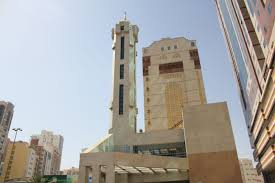 Makkah, Oct 27: Experts have called on the government to protect various ancient sites and mosques in Makkah because of their religious and historical importance.
Makkah, Oct 27: Experts have called on the government to protect various ancient sites and mosques in Makkah because of their religious and historical importance.
Talal Al-Sharif, an Islamic antiquities expert, said the buildings include mosques built during the Ummayyad period and the house of Khadeeja, the first wife of Prophet Muhammad (peace be upon him).
This site is thought to be on the square close to the Marwa hillock.
He said the area where the house stood should be protected as an archaeological site and not used as a prayer area of the Grand Mosque. He said it was important for it to have an entrance, and identified as the home of the Prophet (pbuh).
Al-Sharif said the protection of these mosques would help preserve the country's Islamic history. He said researchers have identified several sites of major archeological importance in Makkah. He said various agencies have started to preserve these sites, including the Saudi Commission for Tourism and Antiquities.
He said the Al-Jinn Mosque was modernized under Saudi rule. He said the Al-Baiah Mosque still exists and goes back to the time of Abu Jaafer Al-Mansour, and Abbasid rule. It was modernized with extensions during the Mamluk and Ottoman periods.
Fawaz Al-Dahhas, professor of Arab history, supervisor of museums at Um Al-Qura University, and member of the advisory committee on Islamic historical sites, said Yathrib tribes met the Prophet (pbuh) at the Al-Baiah Mosque when the Quraish opposed him.
He said Islam was launched from Al-Baiah Mosque, which used to be a ravine between the mountains, known as Al-Ansar Ravine.
This was done in the presence of Al-Abbas, the Prophet’s uncle. He said the ravine was kept intact until the beginning of the Abbasid period. Abu Jafar Al-Mansour built the mosque after Al-Abbas took a pledge to revive his grandfather’s memory. Al-Mustansir Billah renovated the mosque in 1232.
He said other sites include the Al-Rayah Mosque, at the Makkah entrance from the Al-Ghazah side, which was given this name because the Prophet (pbuh) stuck his flagpole there. There is also Al-Jinn Mosque next to Al-Muallah, which was given its name because the Prophet (pbuh) reportedly told his companions, when they saw him coming out of the mosque, that he was teaching the jinn about Islam. It is also known as Masjid Al-Haras (Mosque of the Guards) because the old guards of Makkah used to meet there.





Comments
Add new comment